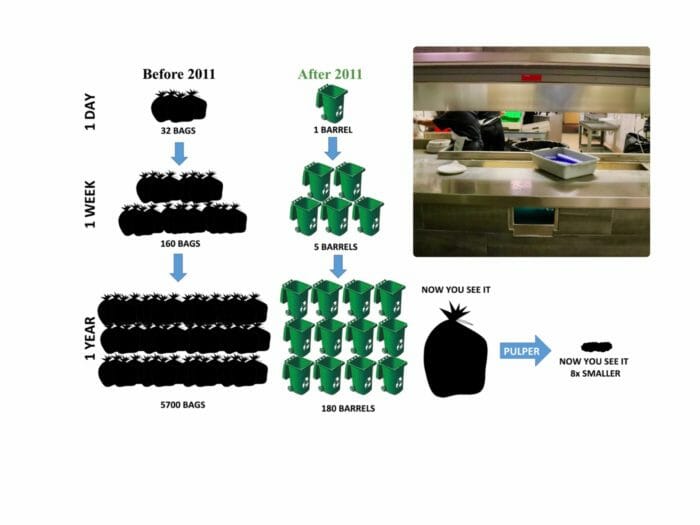The Academy community is constantly looking for ways to combat climate change and protect the environment. From the leadership of Service Board’s recycling coordinators to the quest to become an arboretum, the Academy community has found endless possibilities when it comes to environmentally-friendly initiatives. One of the often overlooked recycling programs which contributes greatly to Academy’s mission to reduce waste going to landfills happens in the Dining Hall each day.
Before 2011, the Dining Hall staff removed around 8 bags of trash during each lunch period. With 4 lunches a day – 32 bags – and 5 school days per week, the result was close to160 trash bags going from the Dining Hall, alone, to the landfills each week. With nearly 180 days of school, this amounted to over 5,700 bags contributing to landfills each school year.
Frustrated with the amount of waste coming from our Dining Hall, Academy’s administration introduced a coupled initiative in 2011 to reduce our school’s carbon footprint.
The school eliminated food trays previously used by all middle and upper schoolers, diminishing portions of food, often previously un-eaten and thrown away. This also eliminated the consumption of water, chemicals and electricity used to clean 1,200 trays each day.
The most significant change was the addition of a food pulper to the dish room, which dehydrated and reduced all food waste and trash to nearly 1/8 of the original volume. Waste was reduced from 32 bags per day to just one barrel of pulped food and trash, the size of a recycling bin. The use of the pulper not only allowed for our school to adopt a more eco-friendly waste disposal system, but also resulted in many additional cost benefits.
The pulper recycles the water used to operate the machine, dramatically reducing the number of gallons used each day. Use of plastic liners has also dramatically decreased as have labor and trash removal costs. These cost benefits outweigh the additional electricity needed to run the pulper.
Even though installing the pulper substantially reduced waste from 5,700 bags a year to 180 barrels, the dehydrated food waste was still going to landfills.
Starting in 2017, our school has partnered with Organic Innovations, a company affiliated with Ohio State University, which is trying to develop a high grade soil with the pulped compost.
Currently, the pulped waste is made into and sold as compost or low grade soils, but Organic Innovations has tested many recipes and appears close to perfecting their research. The process of creating a high grade soil is extensive as samples from batches must be approved through lab testing. Ideally, three types of soils as well as compost will be available by Spring 2019.
A “full circle” approach is the end goal for Academy, as our school hopes to purchase the Organic Innovations soil made with pulped waste from the Dining Hall and use it in the Peck Greenhouse and the adjacent garden to grow herbs that could be used in the Dining Hall.
The composting program at the Academy Dining Hall has the potential to revolutionize the concept of food waste. While eating lunch in the Dining Hall, we often forget about the waste accrued during mealtime and overlook the efforts taken by our school to turn food waste into an environmentally friendly product. We treat the pulper as the place where we dump off our dishes and cutlery rather than the essential component of the dish room that is transforming the way that our school interacts with the environment. It is high time that we start appreciating the pulper and all it has done to help the Academy community reduce its carbon footprint and, instead, perform a “180,” turning our food waste into soil.
We can do our part to help the operation of the pulper by throwing plastic smoothie cups in the recycling “bottles” placed in the Dining Hall, throwing milk carton in the trash can, but keeping everything else on our plates, ensuring that as much waste as possible is decomposed and recycled.
What goes in the pulper: Any food, napkins, other paper waste
What goes in the recycling “bottles”: Plastic smoothie cups
What goes in the trash bins: Milk and cereal containers, non-food, non-paper, non-recyclable waste








